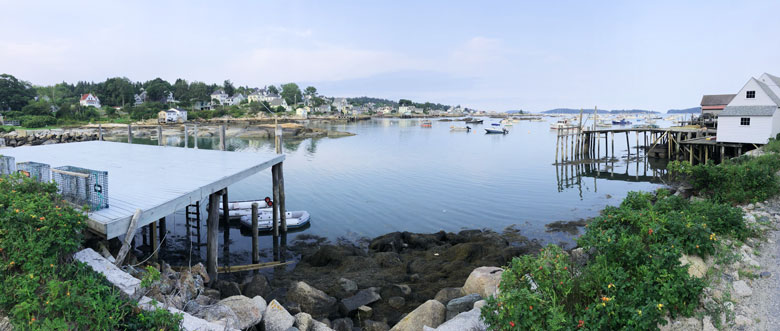In a place like Deer Isle, where tradition and self-reliance run deep, reliable energy is more than a convenience; it’s a lifeline. This remote, working waterfront community off the coast of Downeast Maine faces unique energy challenges. When outages strike, which happens frequently due to the heavily forested nature of the island, it can take anywhere from 24 hours to a week to restore power. That’s not just an inconvenience; it’s a direct threat to public safety, local schools and businesses, and Stonington’s $55 million lobster economy.
Recognizing that energy resilience is vital for long-term sustainability, in 2023 the towns of Deer Isle and Stonington applied to the U.S. Department of Energy’s Energy Technology Innovation Partnership Project (ETIPP). The DOE-funded program is managed by the National Renewable Energy Laboratory (NREL) and provides technical assistance directly to communities. As the regional partner for the Northeastern Seaboard, Island Institute has supported and guided Deer Isle and Stonington through the ETIPP process, along with thirteen other communities since the program began in 2019.
“Increasing our island’s energy resilience while reducing our higher-than-average energy costs is key to our community’s long-term sustainability,” said Linda Nelson, Economic and Community Development Director for the Town of Stonington. “With the facilitation of the Island Institute, the ETIPP program has brought us together with our primary energy provider, Versant, and experts from the National Renewable Energy Lab to explore what is possible and realistic for our small community to achieve. With their help, we now have two demonstration microgrid projects underway, and an application out to fund a large battery energy storage system (BESS). Forward motion!”
“Increasing our island’s energy resilience while reducing our higher-than-average energy costs is key to our community’s long-term sustainability.”
–Linda Nelson, Economic and Community Development Director for the Town of Stonington
This is exactly what ETIPP was designed to do: support rural coastal and island communities like Deer Isle and Stonington to explore affordable, reliable, and locally driven energy solutions. Many rural towns in Maine sit at the literal and metaphorical end of the line—first to lose power, last to get it back. ETIPP connects these communities with experts who offer deep-dive support for energy planning, engineering analysis, and community engagement. While each community’s energy challenges are unique, the program also provides space for communities to learn from others that are exploring novel but replicable energy solutions.
Island Institute plays a central role in these projects by convening local stakeholders, national labs, and utility companies to ensure each solution is grounded in community needs and economic realities. With Island Institute’s facilitation, the process builds capacity in local governments by helping them understand energy options, ask the right questions, and prepare for funding and implementation.
Importantly, ETIPP is not about quick, one-size-fits-all fixes. It’s about taking a holistic look at each community’s energy landscape. Across the country, ETIPP has supported 57 communities through four cohorts, helping them evaluate options like community-scale solar, microgrid feasibility, biofuel processing, water system resilience, marine energy, and grid-hardening through vegetation management. The program goes beyond technical reports; it equips communities to make informed, forward-thinking decisions that balance innovation with practicality. Local leaders retain ownership of the process and the future it shapes.
Applications are now open for ETIPP’s fifth cohort, and Island Institute is calling on Maine’s rural coastal and island communities to apply. Communities accepted into the program will receive tailored technical assistance from national labs, up to $50,000 in direct support, and dedicated partnership from Island Institute to guide them from start to finish.
Energy resilience is not just a future goal; it’s a present necessity. If your town wants to explore energy independence, reduce costs, and build a more secure future, now is the time to step forward.
Apply by July 27th to join the growing network of rural communities powering their own path forward. Visit this page or contact Community Development Officer Kate Klibansky at kklibansky@islandinstitute.org to learn more.


